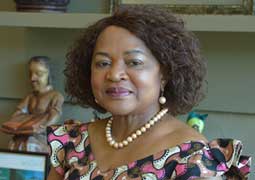
Parliamentary Budget Offices (PBOs) play a critical role in strengthening good governance and democracy by providing technical support to Parliaments to be able to analyse government budgets and conduct effective fiscal oversight, said National Assembly Speaker, Ms Baleka Mbete.
She was addressing the 2nd Conference of the African Network Parliamentary Budget Offices on the theme: “The Role of PBOs in African Parliaments’ Fiscal Oversight: Contribution to the African Development Agenda”.
Ms Mbete greeted the conference delegates with the phrase: “Karibuni nyumbani”, which means “welcome home” in Swahili.
The Speaker said PBOs provide an important contribution to enhance the role of Parliaments in their pursuit for better governance, fiscal oversight as well as economic development.
“We all share a commitment to enhance the role of Parliaments in their pursuit of better governance, oversight and economic development. Our efforts can help improve the security and well-being of the people of Africa and the world,
“Our vision is to promote and contribute to sustainable development, democracy, the rule of law, human rights, and peace and security, within a safe, peaceful and prosperous Southern African region and Africa, as well as a fair and just world,” said Ms Mbete.
She said the contribution of the PBOs and many more related initiatives are making a significant impact on Parliaments’ oversight role in transformation.
The role of a PBO is to provide independent, objective and professional advice and analyses to Parliament on matters related to the budget and other Money Bills and it also supports the implementation of the Money Bills Act by undertaking research and analysis for the Finance and Appropriations Committees in both Houses of Parliament.
The Constitution of the Republic of South Africa that was promulgated in 1996 required that an Act of Parliament must provide for a procedure to amend Money Bills before Parliament.
In 2009, the Money Bills Amendment Procedure and Related Matters Act was promulgated to give effect to the requirements of the Constitution. The objective of this Act is to provide for procedure to amend Money Bills before Parliament and for norms and standards for amending Money Bills before provincial legislatures and related matters. Section 15 of the Act establishes a South African Parliamentary Budget Office.
The emergence of the PBO concept in recent times has seen more Parliaments from developing countries playing a more active role in the budgeting process of their countries.
Since national budgets often tend to be large, complex and difficult to understand by parliamentarians, given their apparent lack of budgetary expertise, PBOs are there to build budget expertise within Parliaments to assist them, among other things, in fiscal oversight of the executive.
They assist Members of Parliament in understanding the budget process, the broad fiscal challenges facing government and expenditure control and budgetary trade-offs that affect present and future spending.
PBOs also provide objective analysis directly to Parliament about the state of the nation’s finances and trends in the national economy.
The House Chairperson for Committees and Oversight in the National Assembly, Mr Cedrick Frolick, who also chairs the PBO Advisory Panel, said the work of PBOs cannot be overemphasised because budgeting is an important complement of law-making.
“We can be good in making laws but if we don’t budget for their implementation, the laws will not be effective, there will not be any impact on the lives of the people,” said Mr Frolick.
Parliamentary Budget Offices from African countries as well as those from Europe are meeting to share best practices and experiences on how to strengthen oversight on good governance and financial management. Also attending the conference are countries that are in the process of establishing PBOs in their Parliaments.
By Sakhile Mokoena
16 August 2017

